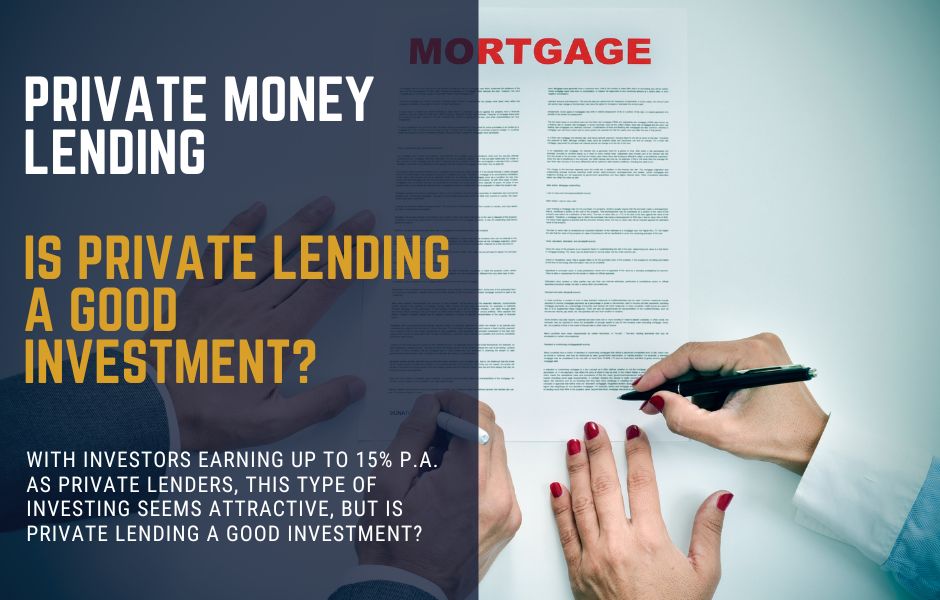Is Private Lending A Good Investment
Investor Bonus: See fully-vetted private lending investments
With interest rates for borrowers at near-time record highs, many investors are cashing in by investing in private lending. But is private lending a good investment? Let's find out right now...

David Garner
Is Private Lending a Good Investment
In the world of investing, there are numerous opportunities to grow your wealth, from traditional stocks and bonds to alternative options like real estate, startups, and private lending.
Private lending, in particular, has gained traction as an attractive investment avenue, but is it a good investment choice for you?
In this article, we’ll delve into the world of private lending to help you make an informed decision.
Investor Bonus: Join 5,000+ investors and get fully-vetted private lending investments delivered direct to your inbox for free every Thursday
What Is Private Lending?
Private lending, often referred to as peer-to-peer lending or private loans, is a form of investment where individuals or entities lend their money directly to borrowers.
This type of lending can take various forms, including personal loans, real estate loans, or business loans.
For the purposes of this article, I’m talking about asset-backed private lending. This is where a piece of real estate is pout up by the borrower as collateral for the loan.
5 Ways to Invest in Private Lending
Before diving into whether private lending is a good investment, let’s explore the different ways you can engage in this form of investment:
- Peer-to-Peer Lending Platforms: Online platforms like Prosper, LendingClub, or Funding Circle facilitate private lending by connecting investors with borrowers. Investors can review borrower profiles and select loans to fund.
- Real Estate Crowdfunding: Platforms like RealtyShares and Fundrise allow investors to pool their funds to invest in real estate projects, providing a diversified approach to private lending in the real estate sector.
- Private Mortgage Notes: Investors can directly lend money to individuals or businesses and secure their loans with tangible assets like real estate, providing security in case of default. You can buy these loans via online trading platforms like Paperstac.
- Direct Private Lending: You can originate your own loans to real estate investors who need capital for their own investment projects
- Hard Money Lenders: hard money lender are professional lender who loan money to real estate investors. You can partner with a hard money lender on a loan, or invest in their lending fund.
Benefits of Private Lending
Private lending comes with several benefits that make it an attractive investment option:
- Higher Returns: Private lending often offers higher interest rates compared to traditional savings accounts or bonds, potentially leading to significant returns on your investment.
- Diversification: It allows investors to diversify their portfolios by investing in different types of loans, spreading risk across various borrowers and industries.
- Control: Investors have more control over their investments and can choose borrowers based on their risk tolerance and financial goals.
- Steady Income: Private lending can provide a steady stream of income, as borrowers make regular interest payments.
Investment Returns from Private Lending
The potential returns from private lending can be lucrative. However, they can vary depending on factors like the type of loan, interest rate, and the borrower’s creditworthiness.
On average, investors can expect returns ranging from 5% to 12% or even higher in some cases.
It’s important to note that higher returns often come with higher risk.
Risks of Private Lending
While private lending offers promising returns, it also comes with its fair share of risks:
- Default Risk: There’s always a risk that borrowers may default on their loans, resulting in a loss of principal and missed interest payments.
- Lack of Liquidity: Unlike stocks and bonds, private lending investments are not easily liquidated. You may have to wait until the loan term matures or find a secondary market to sell your investment.
- Regulatory Changes: Changes in lending regulations can impact the private lending industry and affect your investments.
- Market Volatility: Economic downturns can lead to increased default rates and decreased demand for loans, affecting your investment returns.
Conclusion
Is private lending a good investment? It can be, but it largely depends on your financial goals, risk tolerance, and the due diligence you’re willing to undertake.
Private lending offers the potential for high returns, diversification, and control over your investments. However, it also carries risks, including the possibility of loan defaults and limited liquidity.
Before diving into private lending, it’s crucial to thoroughly research and assess your investment options.
Consider consulting with a financial advisor to determine if private lending aligns with your investment strategy.
Ultimately, private lending can be a valuable addition to your investment portfolio, provided you approach it with caution and a well-thought-out strategy.


